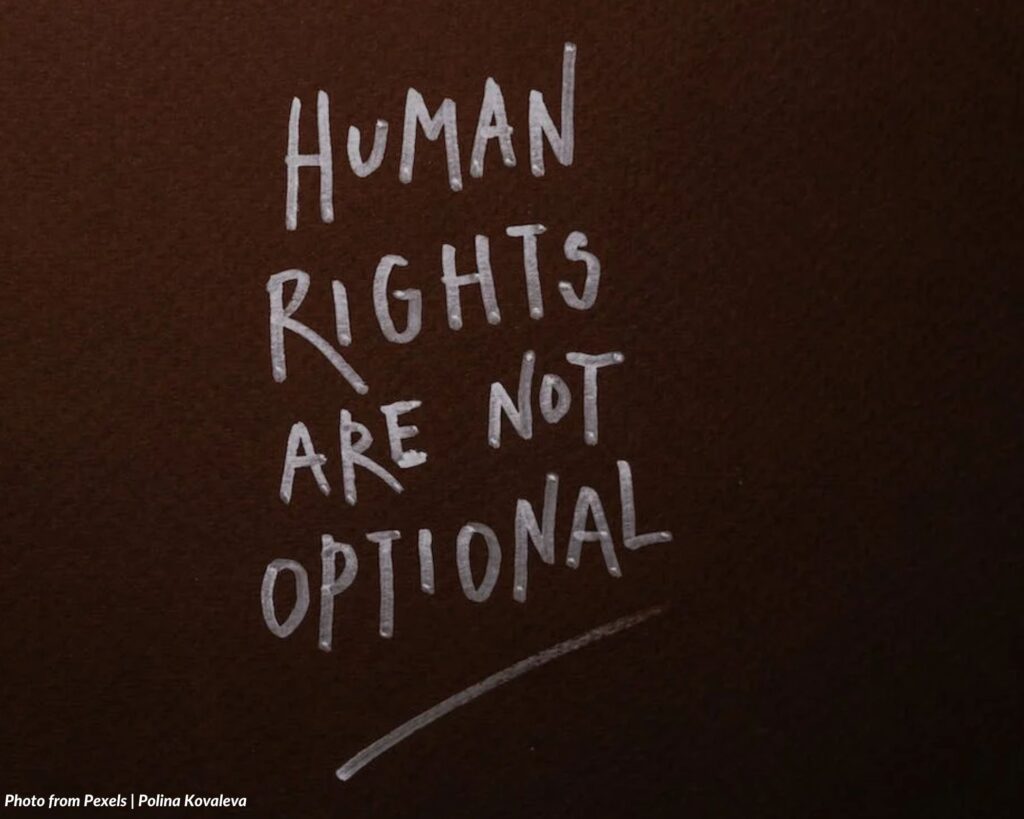
Photo from Pexels | Polina Kovaleva
The following post does not create a lawyer-client relationship between Alburo Alburo and Associates Law Offices (or any of its lawyers) and the reader. It is still best for you to engage the services of a lawyer or you may directly contact and consult Alburo Alburo and Associates Law Offices to address your specific legal concerns, if there is any.
Also, the matters contained in the following were written in accordance with the law, rules, and jurisprudence prevailing at the time of writing and posting, and do not include any future developments on the subject matter under discussion.
AT A GLANCE:
Every December 10 of every year is declared as the Human Rights Day.
Proclamation No. 347, s.1952 says:
“WHEREAS, the Universal Declaration of Human Rights was adopted by the General Assembly of the United Nations on December 10, 1948; and
WHEREAS, the General Assembly of the United Nations invites all States to adopt the tenth day of December of every year as Human Rights Day.”
What is “human right”?
Human rights are inherent rights belonging to every individual, irrespective of factors such as race, gender, nationality, ethnicity, language, or religion. These encompass fundamental rights such as the right to life and liberty, freedom from slavery and torture, freedom of expression, the right to work and education, and various others. These rights are universal and apply to everyone, without any form of discrimination.
Further, the Supreme Court in the case of Brigido Simon vs. Commission on Human Rights (G.R. No. 100150, January 5, 1994) discussed human rights as follows:
It can hardly be disputed that the phrase “human rights” is so generic a term that any attempt to define it, albeit not a few have tried, could at best be described as inconclusive. Let us observe. In a symposium on human rights in the Philippines, sponsored by the University of the Philippines in 1977, one of the questions that has been propounded is “(w)hat do you understand by “human rights?” The participants, representing different sectors of the society, have given the following varied answers:
Human rights are the basic rights which inhere in man by virtue of his humanity. xxx
Human rights include civil rights, such as the right to life, liberty, and property; freedom of speech, of the press, of religion, academic freedom, and the rights of the accused to due process of law; political rights, such as the right to elect public officials, to be elected to public office, and to form political associations and engage in politics; and social rights, such as the right to an education, employment, and social services.
Human rights are the entitlement that inhere in the individual person from the sheer fact of his humanity. Because they are inherent, human rights are not granted by the State but can only be recognized and protected by it.
(Human rights include all) the civil, political, economic, social, and cultural rights defined in the Universal Declaration of Human Rights.
Human rights are rights that pertain to man simply because he is human. They are part of his natural birth, right, innate and inalienable.
The concept of “human rights” appears to be inherently complex and multifaceted, as evident from the diverse perspectives. The varying definitions presented reflect a broad spectrum of beliefs, ranging from the fundamental and inherent nature of these rights to the detailed enumeration of specific civil, political, economic, social, and cultural rights.
What are the basic human rights?
Under the Universal Declaration of Human Rights by the United Nations, there are 30 basic human rights which are as follows:
- All human beings are born free and equal.
- Everyone must be protected against discrimination.
- Everyone has the right to life, liberty and safety.
- Everyone has the right to be free from slavery.
- Everyone has the right to be free from torture.
- Everyone has the right to be recognized before the law.
- We are all equal before the law.
- Everyone has the right to seek justice if their rights are violated.
- No one should suffer arbitrary arrest, detention or exile.
- Everyone has the right to a fair trial.
- Everyone has the right to be presumed innocent until proven guilty.
- Everyone has the right to privacy and freedom from attacks on their reputation.
- Everyone has the right to freedom of movement.
- Everyone has the right to seek asylum from persecution.
- Everyone has the right to a nationality.
- Everyone has the right to marry and to have a family.
- Everyone has the right to own property.
- Everyone has the right to freedom of thought, conscience and religion.
- Everyone has the right to freedom of opinion and expression.
- Everyone has the right to freedom of peaceful assembly and association.
- Everyone has the right to take part in government and to have equal access to public service.
- Everyone has the right to social security.
- Everyone has the right to work, equal pay, and to form and join trade unions.
- Everyone has the right to rest and leisure.
- Everyone has the right to a decent standard of living, food, housing, medical care and social services.
- Everyone has the right to education.
- Everyone has the right to participate in and enjoy culture, art and science.
- Everyone has the right to a social and international order where their rights can be realized.
- Everyone has the duty to other people and protect their rights and freedoms.
- No one can take away these rights and freedoms.
Read also: Human Rights Consciousness Week (Republic Act No. 9201)
Alburo Alburo and Associates Law Offices specializes in business law and labor law consulting. For inquiries regarding taxation and taxpayer’s remedies, you may reach us at info@alburolaw.com, or dial us at (02)7745-4391/0917-5772207.
All rights reserved.


